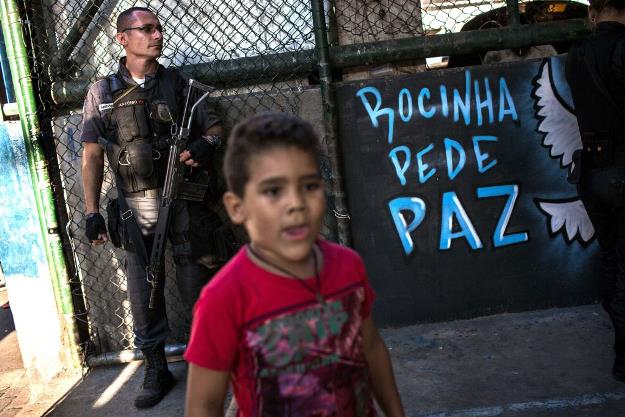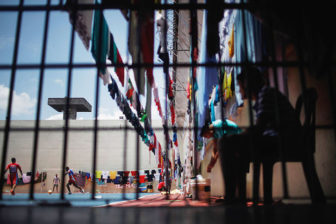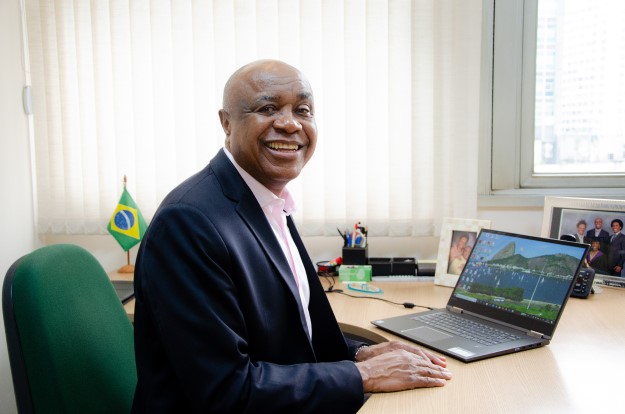RIO DE JANEIRO – The most vital Twitter feed here these days is called Onde Tem Tiroteio, or “Where There Is a Shootout.” One recent afternoon, in a span of just a few hours, it sent these alerts to its 36,000 followers:
“Shots heard in Botafogo, near Santa Marta and Cobal. Attention in the region.”
“A grenade was thrown on the pedestrian bridge near Zuzu Angel Tunnel. Avoid the tunnel.”
“Many shots heard in the surroundings of Humaitá, coming from the jungle. Attention in the region.”
“Shots on 2nd Street in Rocinha, police base under shooting attack.”
“We ask that today you avoid going to the Chinese Lookout in the Botanical Gardens. Reports of armed men in the region.”
It’s not just Rio – violence throughout Brazil is out of control, and has been for many years. The statistics are by now familiar: There are roughly 60,000 homicides a year, a higher death toll than that caused by Syria’s civil war. About one in every 10 gun deaths in the world is thought to occur here. But amid the carnage, something new is happening: Brazilians appear increasingly unwilling to tolerate it anymore. Ahead of 2018 elections, many say they would vote for an authoritarian candidate if it meant they would be safer on the streets. About 35 percent say they would even support a military coup. Law and order issues, even more than the crippled economy, could well define who becomes Brazil’s next president.
At present, the only major candidate talking prominently about violence is Jair Bolsonaro, a former Army captain who has made nostalgia for Brazil’s 1964-85 dictatorship the core of his appeal. Bolsonaro’s proposed policies, which include loosening gun laws and giving police “carte blanche” to kill suspected criminals, horrify most security experts, who warn they would only increase the bloodshed. Some have compared him to Rodrigo Duterte, the Philippine leader whose “war on drugs” has claimed at least 7,000 lives. His comments on LGBT issues, rape, race and torture have also repulsed many. Yet his promises of a crackdown on crime, plus deep frustration with a political class seen as corrupt and self-serving, have helped catapult Bolsonaro to second place in polls, with a clear chance at an eventual runoff.
Spend several days in Rio, as I did last week, and you start to understand voters’ desperation. Homicides in the city and surrounding state are up 16 percent this year, gang wars rage in numerous neighborhoods and the Army has been called in to patrol the streets. Parents are keeping their kids home from class because of shootouts. On Tuesday, Marcelo Luis da Silva Galvão became the 106th Rio state policeman to be shot dead this year. Even samba schools have rescheduled pre-Carnival rehearsals so members can rush home before midnight. Everybody in Rio seems to be walking faster these days; hardly anybody thinks a solution is near. In a poll published last week, 90 percent of residents said they feel unsafe at night; 72 percent said they’d like to they’d like to leave the city altogether because of violence.
Law enforcement officials in particular have embraced Bolsonaro, said Robson Rodrigues da Silva, a former senior commander of Rio’s state military police. “He offers the promise of an easy solution, no matter how dangerous it would be,” he told me. “Bolsonaro touches their hearts, what they’re suffering.” Rodrigues said a recent internal study found that 60 percent of police stationed in crime hotspots were so psychologically traumatized their decision-making was impaired. “Think about what it means to actually live there,” he said.
The takeaway seems clear: Someone else within the field of presidential candidates needs to offer a credible, sane, democratic alternative – a security strategy that respects human rights, but is also ambitious and comprehensive enough to dramatically reduce violence nationwide.
Sounds obvious, right?
But if you raise this idea with establishment politicians, it tends to meet with one of several responses.
One is denial. Many dismiss Rio’s problems as unique – attributable to a post-Olympics malaise, or its oil-driven economic crisis. But the city’s homicide rate in 2016 (about 30 per 100,000 people) was not appreciably higher than Brazil’s as a whole. Other major cities, including Natal (70), Belem (67) and Salvador (55), suffer even higher murder rates – and unsurprisingly, support for authoritarianism is growing there, too. Meanwhile, as this national fever rises, many have embraced the notion that, even in this age of social media, if you just marginalize or ignore Bolsonaro, he’ll go away (It didn’t quite work with Donald Trump, did it?).
Another is political convention. Brazil’s 1988 Constitution stipulates that security is largely the responsibility of state governments. This has been a handy excuse for every Brazilian president since then to pass the buck. Dilma Rousseff (2011-16) reportedly declined to even listen to her justice minister’s homicide reduction plan, believing it wasn’t a federal issue; Luiz Inácio Lula da Silva (2003-10) commissioned two national crime strategies, but never pushed them through; Fernando Henrique Cardoso (1995-2002) later called security one of his presidency’s biggest failings. Through it all, Brazilians have remained trapped between a left that believes effective law enforcement is tantamount to dictatorship-style repression, and a right that believes it consists of sending shock troops into favelas to shoot things up.
The final factor – I’m sorry to say – is just pure, rotten elitism. Most of Brazil’s politicians live in walled-off condominiums or houses, protected by razor wire and private guards. For them, homicides are a largely distant rumor, a problem of the povão – an antiquated term that implies uneducated, unwashed masses. Even last week, I had politicians privately assure me the poor don’t really care about violence – instead, they’ll vote for the candidate who will give them the most generous handouts. This may once have been true, but it ignores modern-day trends. Brazil’s middle class has expanded by some 35 million people over the last two decades; their growing intolerance for old practices has already caused seismic shifts in national politics. In the most recent Datafolha poll, the percentage citing violence as Brazil’s worst problem has doubled since December; only unemployment, corruption and healthcare were seen as more pressing.
It is immoral and ultimately suicidal for Brazil’s political class to continue to treat violence as somebody else’s problem, or some kind of taboo. The crisis is severe enough that all solutions should be on the table, as long as they are democratic and respectful of human life. Possibilities include reforming the Constitution to give more crime-fighting responsibility to the national government; merging the civil and military police forces; and a sweeping fiscal reform that would dedicate more resources (including technology) to law enforcement, and less money for areas like public-sector pensions. Rodrigues da Silva, the former police commander, is among those who suggest directing police to focus less on drug interdiction, and more on reducing violent crime. Education and reducing inequality are also surely key, but recent experience proves they are not enough.
Presidential candidates should be unafraid to embrace hard targets for stopping homicides – the Igarapé Institute, a Rio-based think-tank, has suggested committing to a 50 percent reduction over the next decade. Instead of hiding these plans in a desk drawer, they should talk about urban violence with compassion, truth and clear-eyed determination. The alternatives – either the status quo, or the rise of a Brazilian Duterte – are too awful to contemplate.









